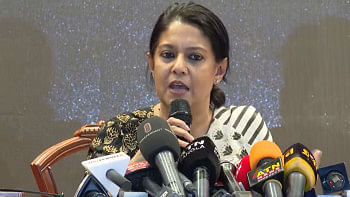Test Relief, Food for Work: It’s now cash for work

In the wake of depleting food stock and sluggish public procurement of foodgrains, the government has started providing cash instead of rice and wheat to implement its Test Relief and Food for Work programmes.
Those who carry out tasks such as repair of roads, drains and culverts under the schemes will get cash till the end of the current fiscal year, food ministry officials told this newspaper yesterday.
Every year, the government takes up rural infrastructure development schemes meant for creating temporary employment opportunities for the poor.
It allocates three to four lakh tonnes of rice and wheat for paying the workers under the programmes. In this year's budget, Tk 1,600 crore has been allocated for the purpose, said the ministry officials.
The change in payment method follows the government's failure to replenish food reserve and achieve its procurement target of rice and paddy during the last Boro harvest and this Aman season.
The country's food reserve dwindled to 6.47 lakh tonnes last month. In July last year, the government had a rice stock of 11.88 lakh tonnes.
During the same period in 2019, the food department had a stock of 16.74 lakh tonnes of grains, according to data from the Food Planning and Monitoring Unit of the food ministry.
The stock started falling in June last year as distribution under the social safety net and other government programmes continued despite sluggish procurement of foodgrains.
Farmers and millers refrained from selling foodgrains to the food office at the government-fixed rates as the prices were soaring.
An increase in distribution of cereal among those affected by the Covid-19 pandemic and recurring floods also contributed to the drop in the stock, said the food ministry officials.
The depleting stock and the failure to procure sufficient quantity of paddy directly from the growers forced the government to pay cash under the Test Relief and Food for Work programmes, they said.

"We are giving cash this year, but we may go back to [the usual method of payment] grain again next year," Food Secretary Mosammat Nazmanara Khanum told this newspaper yesterday.
Paying cash under such programmes helps prevent pilferage and irregularities, she noted.
"It's a good thing, but it is not possible to give money all the time. We have to buy crops from farmers to encourage them."
The government procures from farmers so that they get a fair price for their produce, the secretary added.
Mustafizur Rahman, a distinguished fellow at the Centre for Policy Dialogue (CPD), welcomed the government decision.
A good sum is spent and a significant amount of time is wasted on storage and logistics for providing foodgrains under these programmes, he said.
"We hear about problems regarding this all the time. I think it's a right decision to give money."
Mustafizur is of the opinion that the payments should be made through digital platforms to check pilferage.
PROCUREMENT GOALS MISSED
The Directorate General of Food sought to procure 19.5 lakh tonnes of Boro paddy and rice from April 26 to September 15 last year. But it could buy only 9.09 lakh tonnes during the period.
It is also going to miss its Aman procurement target this season.
The directorate's target was to procure eight lakh tonnes of grain during the Aman season between November 20 last year and February 28 this year. It, however, could buy only 73,000 tonnes till February 25.
The government failed to achieve the procurement target mainly because it fixed paddy and rice prices lower than production costs at the farm level.
This prompted the government to revise its allocation of foodgrains for various public food distribution systems in the current fiscal year. It reduced the allocation to 24.55 lakh tonnes -- 18.65 lakh tonnes of rice and 5.90 lakh tonnes of wheat -- from 31.35 lakh tonnes, according to food ministry documents.
As of January, around 13.39 lakh tonnes of rice and wheat were distributed through the government's free and subsidised food distribution programmes.
More than 11 lakh tonnes of foodgrains -- 8.25 lakh tonnes of rice and 2.89 lakh tonnes of wheat -- need to be distributed till the end of the current fiscal year, said the documents.
To replenish its stock of foodgrains, the food department has already decided to import 10 lakh tonnes of rice. It has signed agreements to import rice through international tender and also under government to government (G2G) arrangement.
Food Secretary Nazmanara said the process of importing seven lakh tonnes of rice is underway.
"We have also cut the rice import duty to replenish the reserves," she said.
Mustafizur, however, thinks the move to import rice should have been taken much earlier.
It doesn't matter now whether the government pays in cash under these programmes or imports rice to boost stocks because traders have already got a message that the government is in crisis of foodgrains, he noted.
The traders cashed in on the situation and increased rice prices, said the CPD distinguished fellow.



 For all latest news, follow The Daily Star's Google News channel.
For all latest news, follow The Daily Star's Google News channel. 



Comments